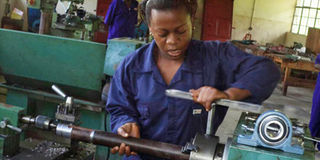Prime
Promoting girl-child technical education

Brenda Namakula a mechanical engineering student at Uganda Technical College, Bushenyi during a lesson. Photos by Zadock Amanyisa
What you need to know:
- According to Business Technical Vocational Education Training (BTVET) 2011-2021 strategic plan, females account for only about one fourth of public BTVET enrollments, and are concentrated in traditional female occupations.
Uganda is making strides in promoting vocational education. But most importantly there is need to promote and encourage high enrollment of the girl-child for technical education.
In Bushenyi District, Uganda Technical College is spearheading this move by improving the female numbers at the institution.
Out of the 735 students at the institution, 115 are female. This number is higher than other sister colleges such as UTC Kichwamba where only 94 out of 485 students are female.
The authorities at the UTC Bushenyi believe both female and male should be given equal chance at vocational training.
The female numbers have increased to 115 from 30 in 2007. However there is a registered drop of 13 students from 2016 according to the institutional relations officer, Harriet Tushabe.
Moreen Tumwekwatse is a graduate at UTC Bushenyi. She graduated with a First Class Diploma in Electrical Engineering in 2015. During her secondary education, the consultant in solar installation at FRES Uganda, a solar energy company, says she was always curious to know how artificial light was made.
Because she performed well in science subjects, Tumwekwatse was determined to pursue electrical engineering and follow in the footsteps of his uncle who was an engineer.
She was discouraged from pursuing engineering by her friends who mostly claimed it was a man’s field and she would not make headway in that field, but did not give up.
Career guidance
According to Business Technical Vocational Education Training (BTVET) 2011-2021 strategic plan, females account for only about one fourth of public BTVET enrollments, and are concentrated in traditional female occupations.
Uganda Technical College, Bushenyi is addressing issues pertaining to participation of females in science and technological education, which has for a long time been dominated by male counterparts.
The institution is working at achieving at least 20 per cent female enrollment by carrying out public awareness campaigns such as girl-child in technical education celebrations, radio talk shows and visiting girl-child institutions.
They are also putting a lot of career guidance in the lower education section (primary and secondary) to ensure that the girl-child is attracted to technical education.
The college has been able to attract more female students through the annual Girl Child in Technical Education day where they participate in exhibitions and cleaning of nearby towns.
Girls from secondary schools are invited to the college to see what technical skills girls can study. The girls at the college are sensitised to love their courses by female role models in technical education. These efforts have encouraged females and helped them stay in school, complete their courses and transit to work.
Challenges
With the improvement come some challenges that range from parents to students’ attitude and cultural values. For example, some cultures such as the Banyankole culture do not allow girls to climb yet they would want to study courses such as civil engineering, electrical installation and others where girls climb to execute duties.
Most parents still have a poor mindset towards technical education and insist that their children must enroll for degrees in universities.
“This has become hard for us as a college to attract students from good schools. Parents look at technical education as a vocation of failures. Those who come here consider us as the last option,” says Tushabe.
Joan Birungi, an electrical engineering year one student, says they are sometimes despised by even their male counterparts but guidance sessions have helped them to love their courses.
“It depends on what an individual wants. At the end of the day staying focused helps us to know that we are winners,” she says.
The college principal, Silver Mukwasiibwe, stresses the need for more support to attract female students not only to UTC Bushenyi but to all other technical and vocational institutions.
“We also need support in putting up facilities and infrastructure that can attract and support girls to join technical institutions,” says Mukwasiibwe.
Female students in vocational institutions require adequate mobilisation for active participation in production and national development. More efforts should be geared towards bringing them on board since education of the girl-child is a valuable asset to national development.



